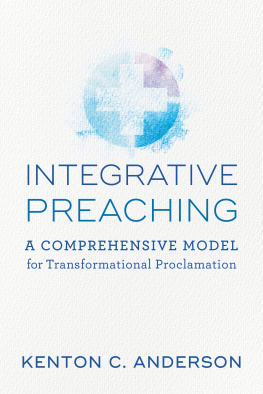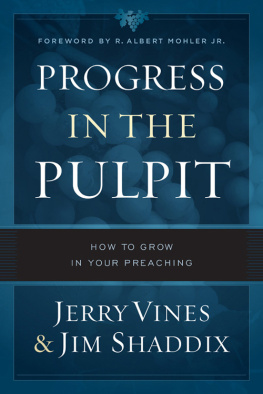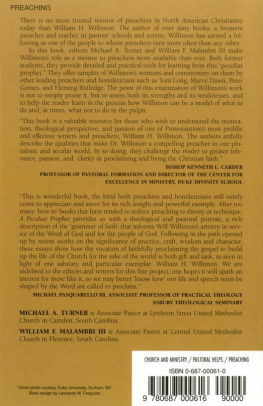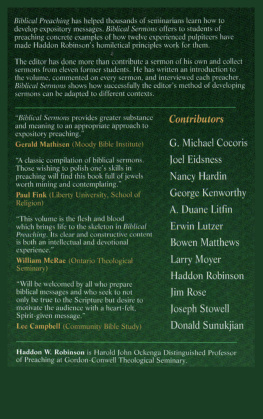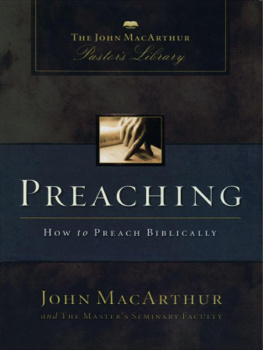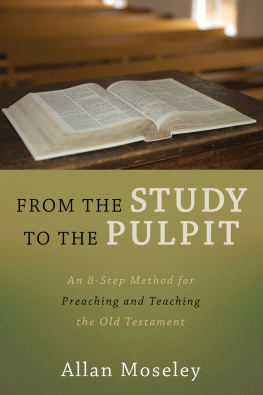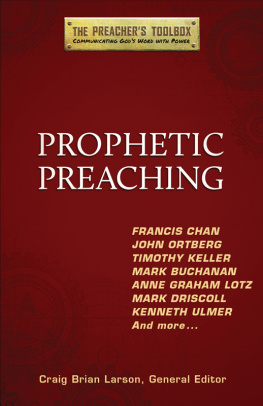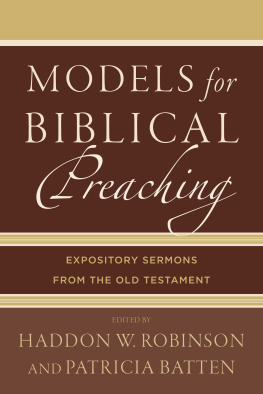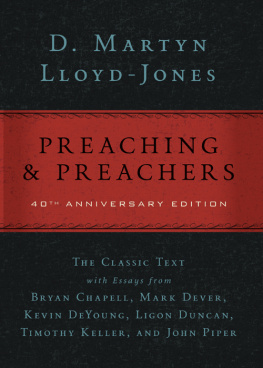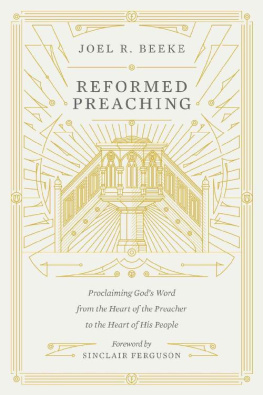1. Preaching Is Integral (Cohesive)
2. Preaching Is Horizontal (Physical)
3. Preaching Is Vertical (Spiritual)
4. Preaching Is Centripetal (Kinetic)
5. The Story That Engages
6. The Theme That Instructs
7. The Gospel That Convicts
8. The Mission That Inspires
9. Problems: The Preacher as a Pastor
10. Points: The Preacher as a Theologian
11. Prayers: The Preacher as a Worshiper
12. Pictures: The Preacher as a Prophet
13. Discover the Message
14. Assemble the Sermon
15. Master the Outcome
16. Deliver the Event
Preface
I have been teaching and writing about preaching for about twenty-five years. I have preached in hundreds of churches and conference centers to many thousands of people. After a while it starts to feel like experience, and experience always ought to be shared. This is not my first book on the subject of preaching, but it is my most comprehensive. It is not the only word on the subject, but it is a good word, and it is the best that I have to offer. If you work with these suggestions, I am confident you will be a more effective preacher, and that will be good for the kingdom, good for the church, and good for all of us who listen.
I am grateful to my students and readers across these years who have respected the process and given it a go. I appreciate the helpful comments and the opportunity to test these ideas across the canvas of a few thousand student sermons. I believe preaching is transformative, even when it is offered by students who are learning the craft. My faith has been nurtured by these opportunities to hear from God.
I am grateful to my colleagues, who have trusted me with the students we have mutually loved.
I am grateful to my listeners, who have sat under the sound of my preaching. I trust that you have heard from God and have been transformed by what our God has said to you.
I am particularly grateful to my family, who continue to encourage me and who value what I do. Those who know my wife, Karen, will recognize her input on many of these pages. In her chaplaincy work with senior citizens, she has had many opportunities to test these thoughts in action.
I am most especially grateful to God, who has been pleased to make himself known in the world through the preaching of his Word. I am amazed and gratified that he has been willing to use me in this work that is so central to his heart.
Additional materials helpful in learning and sharing the principles in this book can be found at www.preaching.org .
Introduction
Preaching is a particularly confident way of speaking. When a football coach says that he is preaching defense to his team, he is speaking in an especially authoritative mode, welcome on the practice field, though less so elsewhere. A players job depends on the pleasure of his coach. His is not to question why. His is to defend or die. The player must presume the coachs authority if he wants to keep his job. Coaches can preach. Others might better hold their tongue.
The places where we welcome preaching are few and seldom. A parent, perhaps, could preach to a child until a certain age. A deeply trusted friend could adopt the role of preacher, though perhaps in sparing measure. A pastor preaches as the function of his or her calling, which is a complicated matter.
There was a time when preaching was in voguewhen people were willing to grant authority to the man of the cloth who spoke for God among the people. There was a time when people were comfortable submitting to authority. That time is not today. No one is going to grant you privilege because you are a preacher. No social or financial benefit is going to come your way. You may have to pay relational capital instead of gaining it. To read this book and put its principles into practice might require of you a kind of courage. The day when preaching brought a sense of cultural privilege is long past.
In fact, many will see preaching as unwelcome, and sometimes even rude. Polite society agrees that we must not speak of things that demand or divide. Preaching is just too confidentarrogant even. Our subject too threatening. Our conclusions too demanding. Friends dont let friends attend to sermons.
And yet here we are, you and I, sharing thoughts around this theme of preaching. The Bible is clear, and our calling is unshaken. We must preach the Word, despite the constant opposition we will have to deal with. We remember that Paul told Timothy to expect a time when people would not put up with what we have to saythat they would turn their heads instead to those whose words would soothe the itching of their ears. We understand that this is the way of things, and we would not expect it to be any different.
There are those who have an ear for this. We understand that preachers travel narrow roads, but we understand that those pathways lead to special places. We believe we preach in the presence of God and of Christ Jesus and that we will be accountable for what we have to say. If we can keep our head and do the work of our callings, we will find that there are those God has especially prepared to respond to what we have to sayto what he has to say.

